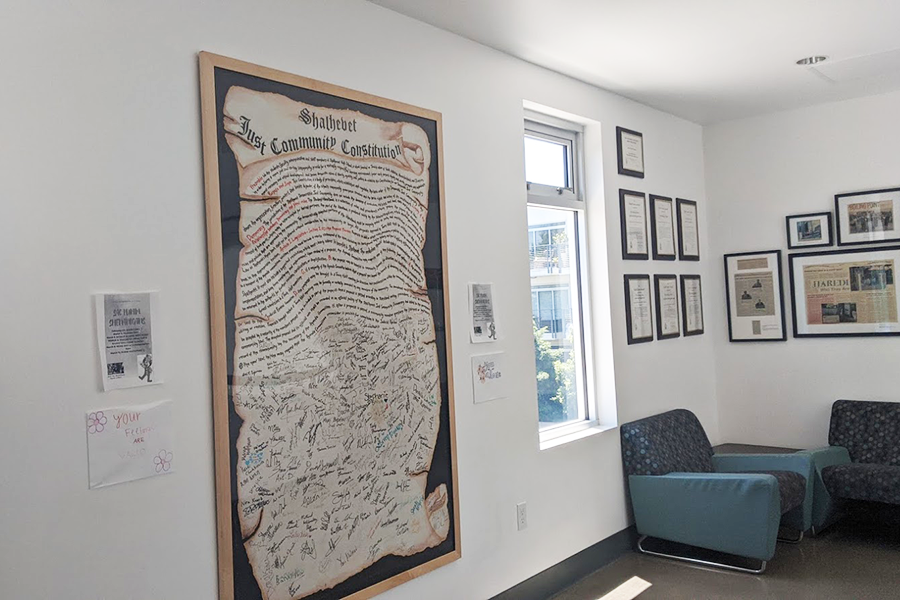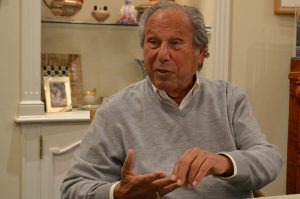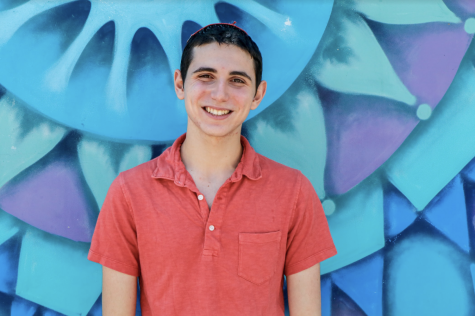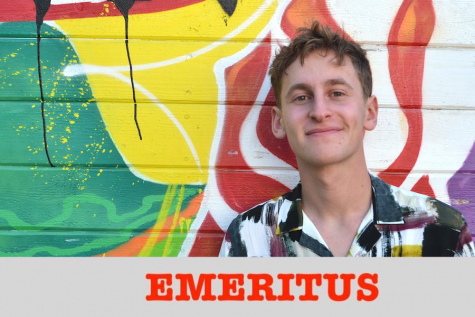CONSTITUTION OVERHAUL IS APPROVED, 149 – 20
REVIVED: An original of the preamble to the Just Community constitution, signed by students and staff in 2002, dominated the second-floor hallway Thursday, day 39 of distance learning due to the coronavirus pandemic. Proponents said changes would bring the constitution into line with what school is like now, and also help more proposals be enacted.
May 14, 2020
UPDATED MAY 16: After a year of discussion, deliberation, meetings and last-minute revisions, members of the Just Community voted overwhelmingly today to approve a major overhaul of the Just Community constitution, the most significant change in school governance since it was first approved in 2002.
The final vote was 149 to 20 — an 87-to-13-percent margin — and every grade approved it, although the vote was much closer among this year’s junior class, where the margin was 13 votes to 11.
The goal of revising the constitution has been a priority for many past Agenda Chairs, but it never progressed beyond one or two meetings. This year, a committee of three seniors — Agenda Chair David Edwards, Fairness Co-Chair Evan Rubel and constitution activist Sabrina Jahan — was able to actualize it.
“The Just Community is honestly something that’s beautiful and it’s unique, and no one really understood that, and I think honestly I can say with confidence that after this whole process … people understand that a lot more,” said Sabrina after the victory was announced.
She said the group also hoped to improve on the original document. Several sections had fallen into disuse, and Town Hall’s original definition which described Town Hall as a place for proposals was no longer in practice.
“We wanted to make the processes more fluid and more up-to-date, and work better,” Sabrina said. “And we wanted to take the values and turn them into something that was more pragmatic instead of something too idealistic.
“But at the heart of it what we were doing is ensuring that people actually understand what the Just Community is, because everybody should.”
With 169 votes in all, more than half of the entire community voted in the distance-voting procedure. The school has 257 students this year and about 65 staff.
The Boiling Point had access to real-time poll results throughout the day, as well as the results of the computer program written by Gilad Spitzer to determine if it had passed by a majority in each grade.
Gilad’s program collected voters’ school email addresses, which include each student’s graduating year. The program used that to count the vote within each grade.
At 5:12 p.m., Gilad sent the Boiling Point what he called “the output of the computer program.” It showed the grade-wide breakdowns, which showed the revision had passed all four grades and even the faculty, which favored the new revisions 21 – 2. The ninth-grade tally was 34 – 3, the 10th-grade passed it unanimously 37 – 0, and the 12th grade 44 – 4.
Those numbers were way beyond the two-thirds overall majority and half of each grade that would have been required by the existing constitution to pass such a measure.
“It was an incredible margin and we were very pleased to see that, and honestly kind of shocked, very shocked, when we saw the results,” said David, whose term as Agenda Chair ended with a Constitution-focused Town Hall Wednesday evening.
He said that he, Sabrina and Evan had spent election day thinking about math.
“We were kinda stressing out all day,” David said. “We calculated possible voter turnouts for each grade and what we would actually need for each grade. We were like, okay we would need 13 freshman if 12 of them vote no, and there’s a 40% turnout — things like that.”
But the constitution’s most vocal opponent, newly elected Agenda Chair Kate Orlanski, said she had expected the result.
“I wasn’t surprised that it passed, but then again only half of the school voted for it,” said Kate. “It’s not that surprising that the people that actually went out of their way to vote were people who like wanted it to pass, especially considering a majority of the public information on the constitution was either neutral or pro-constitution and there was not a lot of anti-constitution material public for everyone to see.
“It makes sense that the people who had heard about it and who did care about it voted in favor of it. Who knows what that other half of the school, almost, who didn’t vote for it would have voted?”
The document approved Thursday was characterized as an “amendment,” not a new constitution. Although it contained many revisions, it kept much of the original constitution intact, including statements of community members’ rights to fairness and respect for both students and staff.
It tweaks the definition of Town Hall, adding “While Town Hall is formally a space to facilitate the proposal process as detailed in Article I, Section 3, it also incorporates what the Agenda Committee sees as best for the Just Community.”
A new Judicial Review Subcommittee — which turned out to be the most contentious part of the proposal during Town Halls — is added, along with a provision for issue-specific “councils” to be formed as needed.
Whenever a proposal is suggested, Judicial Review members — leaders of the Agenda, Fairness and Student Activities committees, along with an elected faculty representative and the Head of School — will now decide whether or not it is constitutional before it can be brought to Town Hall.
Judicial Review approvals must be unanimous, giving what some have called a “preemptive veto” — that is, the ability of any one member of Judicial Review, including the head of school, to prevent its advancement. However, proposals that then go on to be passed by the community at Town Hall could no longer be vetoed and would automatically become school law.
The amendment also defines the “values of the Just Community” and the school’s Jewish values, and states that if proposal violated any of those or if it would “seriously detract from the public image of Shalhevet High School if it were passed, with respect to the hashkafa of Shalhevet High School,” Judicial Review would prevent it from being voted on in Town Hall.
In addition, the long-standing Student Activities Committee (SAC), never in the constitution before, is now added as a formal branch of the Just Community. And the Constructive Consequences Committee (CCC), which has not existed at school for many years, is eliminated.
Evan Rubel said he hoped the document’s overwhelming approval would make it easier for members of the Just Community to know what their rights and responsibilities are.
“I think that it means that there will be a lot more clarity — hopefully there will be less confusion,” said Evan. “I also think there will be a little more accountability from all ends, from the administration, for the student body.
“We hope that with this new draft we are reinvigorating and revitalizing the current Just Community, but also bringing a little bit of the ideals of the original Just Community back to into our modern Shalhevet,” he said. “We hope that we are trying to bridge the gap to that original feeling of the Just Community at its founding.”
Head of School Rabbi Ari Segal shared Evan’s hope.
“I’m hopeful that it will enhance the feeling that students have of involvement in the Just Community,” Rabbi Segal told the Boiling Point in an interview.
“The point of it from at least from my understanding is that students should … feel like a proposal that comes before them is actually able to be passed and become the law of the Just Community, and so I’m hopeful that students will feel more invested because of this.”

















Max Rabin, Jerusalem • May 21, 2020 at 1:52 am
I remember participating in the writing of that constitution! Glad to see democracy alive and well, adapting to the current needs of the community. Kol hakavod!